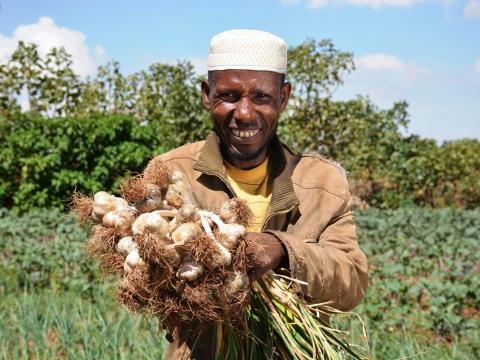Training and seed provision helps a family ensure food security

Mohamed, with five children, lives at Digelu Kidame Village some 225km east of the capital Addis Ababa. He is a subsistence farmer. He feeds his family farming barley and wheat on a one-half hectare of land that he inherited from his parents through rain-fed agriculture once a year.
The harvest he collected three years before was not sufficient to properly provide for the basic needs of his family. “My yearly income was meager. It was not adequate enough to feed my family all year round, let alone provide writing materials, school uniforms and medication.”
Mohamed regularly had to search for some sort of daily labor, often traveling a long distance from home to support his family’s needs as daily labor was not always accessible in the area. In such a case, his family had to face challenges of food and other basic needs. They had to miss lunch or dinner sometimes. Providing them with school materials was also a challenge.
Because of his family’s precarious situation, Mohamed was selected, along with 14 other farmers, to participate in a Gardening for Improved Nutrition and Increased Income group, supported by World Vision in collaboration with the local government. Members of the Income groups and recieved training on vegetable farming and were also supported them with vegetable seeds (including carrot, garlic, cabbage and potatoes) to enable them to increase their access to nutritious foods, diversify their incomes and ensure their food and nutrition security.

The organized farmers who received training and vegetable seed support from World Vision also learned how to use water from a nearby river to irrigate their crops. Thanks to the support, seeds and water, farmers are now producing various vegetables twice a year; one crop through rainfall and the second through irrigation. As a result, the livelihood of these farmers has now improved.
Mohamed now produces vegetable cash crops twice a year. He keeps some of it for his family’s consumption, he sells the rest to the local market and earns about US$2,500. He says, “Since I started producing vegetable crops [twice a year], I am able to provide a balanced diet for my family. Worries of [being able to provide] writing materials and medication expenses have gone from my thought.”
In addition to meeting his family’s basic needs, Mohamed was able to save enough money to buy a milk cow and constructed a residential house for his family. He is also planning to construct another house in a nearby town to rent. He has also a plan to expand his farming. “The farmland I have now is small. I want to contract some more hectares of land and expand my farming and send the vegetable productions to our district market,” he says.